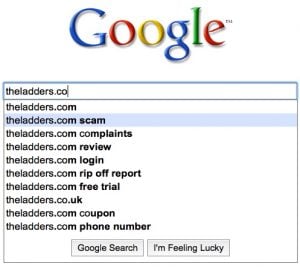Whether you’re changing careers or changing jobs, your challenge is to make yourself stand out from your competition — and your competition might be fierce. You might be competing with people who are more experienced than you, and whose resumes look better than yours.
In this short presentation (from a recent teleconference), I explain to a group of job-hunting executives what it means to stand out — and how to prove you’re worth hiring into a job that’s new to you.
To learn more about how to carefully select your target companies, how to use a business plan rather than a resume to apply for a job, and how to demonstrate your bottom-line value to a company, check out How Can I Change Careers? It’s not just for career changers — it’s a powerful tool for changing jobs.
.

 Toby Googled theladders.com and watched as Google applied its “intelligent auto-complete” feature while he was typing… I’m gonna borrow one of Toby’s graphics that shows the results:
Toby Googled theladders.com and watched as Google applied its “intelligent auto-complete” feature while he was typing… I’m gonna borrow one of Toby’s graphics that shows the results: This audio clip (12:41 minutes) is from a longer segment in which listener “Jim” described a service that wanted to charge him $5,000 for “exclusive job listings.” We discuss that scam and we also talk about:
This audio clip (12:41 minutes) is from a longer segment in which listener “Jim” described a service that wanted to charge him $5,000 for “exclusive job listings.” We discuss that scam and we also talk about: